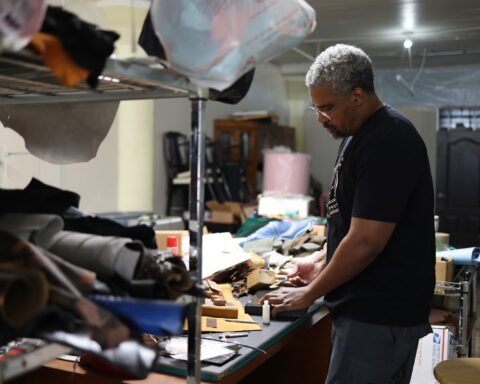Oak Park native Michelle McNamara researched the Golden State Killer for years.
She even wrote a New York Times best-selling book about the man who raped and murdered dozens from 1976 to 1986 in Southern California, “I’ll Be Gone in the Dark: One Woman’s Obsessive Search for the Golden State Killer.”
This week, a suspect was arrested in the case, but McNamara wasn’t here to see it. The true-crime writer died unexpectedly in her sleep in 2016, leaving it to friends and family to celebrate her determination to see what she saw as a “solvable case” solved.
“When everyone woke up to that news, we were like, ‘Holy s—,” said Kera Bolonik, a Brooklyn resident and friend of McNamara’s for 32 years. “Of course, there’s this unanimous feeling that she did this. ‘Oh my gosh, she did this.’ It’s four days after her second anniversary of her death and a week and a half after what would have been her 48th birthday. … All this work took them to this place, so there’s a lot of pride and some sadness that she’s not here to experience that pride and relief and elation, but ultimately what she did want to happen did happen.”
What McNamara wanted was for an identification to be made and resolution for the victims and their families, Bolonik said.
The perpetrator was also known as the East Area Rapist and suspected of murders and rapes in 10 counties throughout California. While armed and wearing a mask, he would enter through windows at night and surprise sleeping victims who ranged in age from 13 to 41.
“Michelle said this guy wasn’t a genius, he just practiced a lot. That’s what this guy did,” Paul Haynes, who collaborated with McNamara on the book, said in an April 5 episode of the “My Favorite Murder” podcast.
Former police officer Joseph James DeAngelo, 72, was taken into custody outside his Sacramento, Calif., home Tuesday and charged with numerous counts of murder. Sacramento County officials said DNA collected from a crime scene of the Golden State Killer was compared to online genetic profiles on genealogical sites to find a match for a suspect.
McNamara’s husband, comedian Patton Oswalt, was at Anderson’s Bookshop in Naperville on Tuesday with Haynes, lead researcher of “I’ll Be Gone in the Dark,” and Billy Jensen, an investigative journalist who also collaborated on the book. At the time, an arrest had yet to be made.
When the news broke, McNamara’s sister Maureen Stratton, said the whole family was ecstatic but “so distraught” that her younger sister was not here to enjoy it.
“We were in Naperville for the book event, and (Haynes and Jensen) seemed very confident talking about it like it was just a matter of time that an arrest was going to happen,” Stratton, an Oak Park resident and Northwestern University law professor, said. “And I remember thinking to myself: ‘They’re never going to find him. I did not have that confidence, so it truly was stunning and shocking, and I think we all just cried. I think we were all like, ‘Omigosh, this is incredible.’”
Stratton recalled McNamara’s writing of the book and the investigation of the case being a sort of push-and-pull that weighed on her. “She just kept thinking: ‘I think we can solve this, I think we can solve this.’ She just felt so strongly that this was solvable and that it really needed to be solved because all of these victims … so it was her life’s mission to figure it out.”
Becky Humbert, a Naperville resident and friend of McNamara’s since seventh grade at Hawthorne Elementary, said she couldn’t describe the emotions she felt after hearing the arrest news.
“Her writing that book, her finishing that, which was always something so important to her was one thing, but this — this arrest, this was what mattered to her. That was more important to her,” Humbert said. “She definitely wanted to provide peace for the victims and the survivors. I think I wavered between crying and having chills all day long. I’m sure all of us did, everyone who loved her and knew her life’s work felt that way.”
Amid expressing their pride in her work and drive, McNamara’s circle reflected on her writing path — from poetry to editor of the Oak Park River Forest High School newspaper to short stories and ultimately true-crime writing. Her blog, True Crime Diary, created soon after her marriage to Oswalt, according to Stratton, focused on hundreds of unsolved crimes. But it was the Golden State Killer that was her most defining case, Haynes said.
“Ultimately Michelle’s objective was singular — to identify the Golden State Killer,” he said. “It’s so sad that Michelle died without knowing this person’s identity; it’s so sad that Michelle is not here right now to celebrate this momentous thing, which is really the prize at the end of the maze that Michelle was seeking.”
Sacramento County Sheriff Scott Jones told reporters that McNamara’s work helped build interest in the case — interest that led to television networks HLN and Investigation Discovery doing series about the case — but he didn’t go as far as saying her book led to a suspect.
Haynes says otherwise.
“Without Michelle’s book and Michelle’s involvement, the motivation and thrust to solve this case wouldn’t be there, so I would say that Michelle’s involvement absolutely had an influence on this case being resolved,” said the Los Angeles-based researcher.
Bolonik agrees.
“When you read her book, she was kind of putting pieces together. … Nobody knew that it was this particular guy; the cops who had been working on the case for 20 years didn’t know,” she said. “But she had a very clear sense of what kind of person they were looking for and how it was going to come about — even through DNA, genetic testing.
“She suspected, she says in the book, that he was connected to the military somehow, that he must have been in law enforcement. Plus she named him the Golden State Killer, which allowed all these jurisdictions to come together — that was the umbrella. Her work and the ability to talk among all these jurisdictions, it enabled her to look at information in new ways and ask questions that had never been asked.
“It was a cold case. No one was talking about this case. It had just languished. But she brought attention to it with her blog and through her article and then with her book. It created a sense of urgency that was so crucial. … She lived and breathed this.”
HBO Documentary Films has acquired rights to the book for a docuseries of its own. Haynes said he’ll definitely continue following every development in the case as it goes forward. “This is only the beginning of a new chapter in this case,” he said.
As the case evolves, McNamara’s sister wants people to remember one thing about her “brilliant, funny” sister.
“It wasn’t about solving the case and getting the glory. She wouldn’t care about that at all. She just wanted to put a face and a name to this horror and get some peace for people. I think she was a very selfless person that way,” she said.
Tribune writer Nara Schoenberg contributed to this report.


